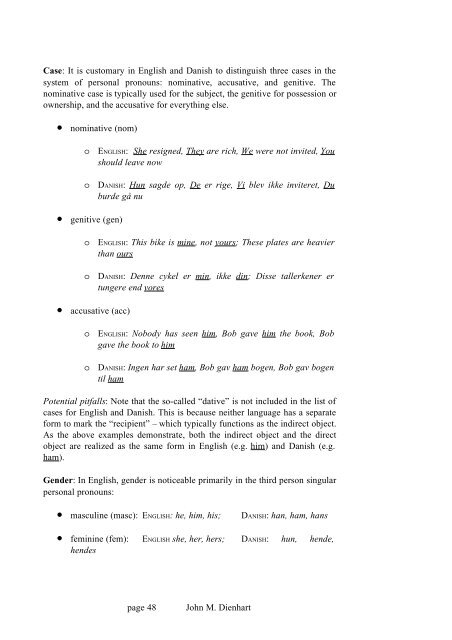Download - VISL
Download - VISL
Download - VISL
Create successful ePaper yourself
Turn your PDF publications into a flip-book with our unique Google optimized e-Paper software.
Case: It is customary in English and Danish to distinguish three cases in the<br />
system of personal pronouns: nominative, accusative, and genitive. The<br />
nominative case is typically used for the subject, the genitive for possession or<br />
ownership, and the accusative for everything else.<br />
• nominative (nom)<br />
o<br />
o<br />
ENGLISH: She resigned, They are rich, We were not invited, You<br />
should leave now<br />
DANISH: Hun sagde op, De er rige, Vi blev ikke inviteret, Du<br />
burde gå nu<br />
• genitive (gen)<br />
o<br />
o<br />
ENGLISH: This bike is mine, not yours; These plates are heavier<br />
than ours<br />
DANISH: Denne cykel er min, ikke din; Disse tallerkener er<br />
tungere end vores<br />
• accusative (acc)<br />
o<br />
o<br />
ENGLISH: Nobody has seen him, Bob gave him the book, Bob<br />
gave the book to him<br />
DANISH: Ingen har set ham, Bob gav ham bogen, Bob gav bogen<br />
til ham<br />
Potential pitfalls: Note that the so-called “dative” is not included in the list of<br />
cases for English and Danish. This is because neither language has a separate<br />
form to mark the “recipient” – which typically functions as the indirect object.<br />
As the above examples demonstrate, both the indirect object and the direct<br />
object are realized as the same form in English (e.g. him) and Danish (e.g.<br />
ham).<br />
Gender: In English, gender is noticeable primarily in the third person singular<br />
personal pronouns:<br />
• masculine (masc): ENGLISH: he, him, his;<br />
DANISH: han, ham, hans<br />
• feminine (fem): ENGLISH she, her, hers; DANISH: hun, hende,<br />
hendes<br />
page 48<br />
John M. Dienhart
















